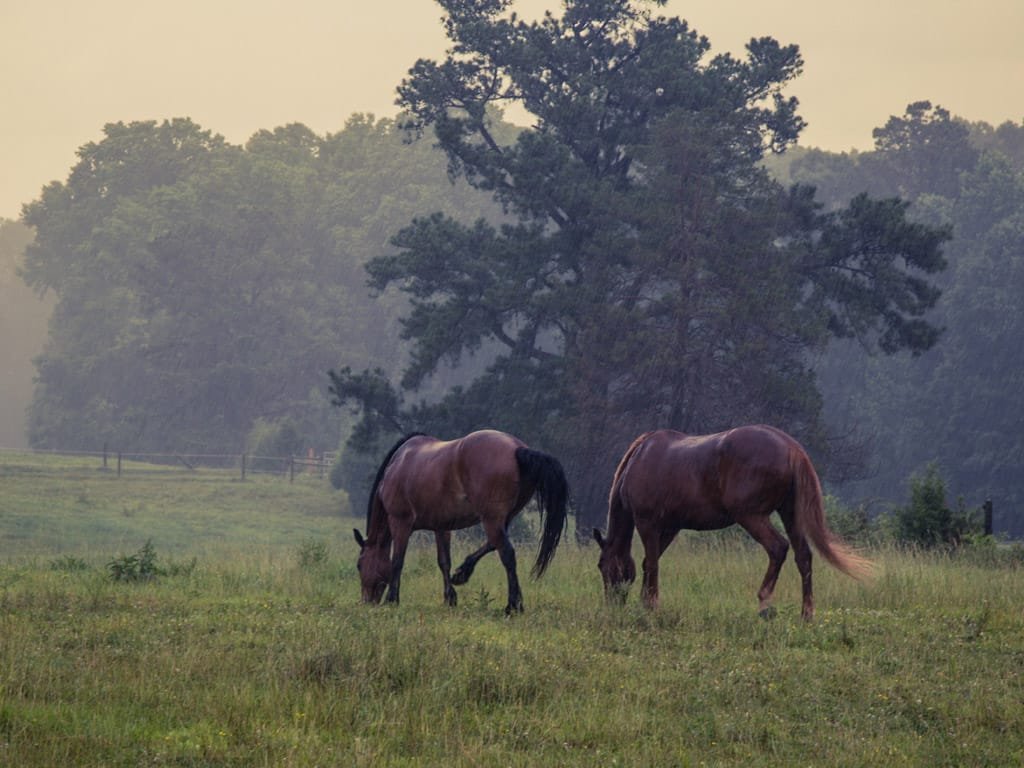Horses are hardy animals and can generally handle different weather conditions,
including rain. However, there are a few factors to consider before deciding whether it’s okay to leave a horse in the rain. While short, light showers may not cause harm, prolonged exposure to rain or extreme weather can lead to discomfort or even health problems. This article will explore the key things to keep in mind when deciding if it’s okay to leave a horse out in the rain.
1. Horses’ Natural Ability to Handle Rain
Horses have evolved to cope with various weather conditions, including rain. Their coats are designed to shed water, and their bodies are built to keep them warm and dry when necessary. However, horses are more vulnerable to cold and wet conditions in certain situations, especially during the winter months or in very heavy rain.
The ability of a horse to tolerate rain depends largely on its coat and the temperature. Horses with thick winter coats are better equipped to handle the cold and wet weather compared to those with lighter coats. Additionally, horses in good health and with adequate nutrition are better able to handle adverse weather conditions.
2. When to Provide Shelter
While horses can stand in light rain without issue, it’s important to provide them with shelter during heavy rainfall or storms. Prolonged exposure to rain can cause horses to become chilled, especially if the temperature drops. This is particularly true for horses with thinner coats or those that have been clipped. A cold, wet horse is at risk of developing hypothermia, which can be dangerous.
If heavy rain is expected, it’s best to move your horse to a barn, stable, or field shelter where they can stay dry. This will keep them comfortable and safe from the elements.
3. The Risk of Mud and Slippery Conditions
Rain often creates muddy and slippery conditions in the pasture or paddock. This can increase the risk of injury to your horse, as slippery ground may cause them to lose their footing and fall. Horses are naturally active, and when they are cooped up in muddy conditions, they may be at greater risk for joint strain, tendon injuries, or hoof issues.
Even if your horse is in a field, make sure there are areas with solid footing or dry ground where they can stand without risk. You can also provide a sheltered area where the ground stays drier and safer.
4. Coat and Blanket Protection
A horse’s coat plays a significant role in protecting them from the rain. A thick winter coat is designed to repel water and keep the horse warm. However, if your horse is clipped or has a thinner coat, it may struggle to stay dry and warm in rainy weather.
In these cases, you may want to use a waterproof blanket or turnout rug to protect your horse from getting soaked. These blankets are designed to keep rain off the horse’s coat while allowing them to move freely. Be sure to check that the blanket fits properly and is securely fastened so it doesn’t shift during movement.
5. Hoof Care
Wet conditions can soften a horse’s hooves, making them more susceptible to injury or infection, such as thrush, which is caused by bacterial or fungal growth in the hoof. If your horse is left in the rain for long periods, be sure to check their hooves regularly to ensure they stay healthy. If you notice signs of thrush or other hoof issues, it’s important to address them quickly by cleaning and drying the hooves.
6. Signs to Watch For
After your horse has been out in the rain, observe their behavior to ensure they aren’t experiencing any distress. Some signs of discomfort or illness from being in the rain too long include:
- Shivering or trembling
- Lethargy or reluctance to move
- Excessive standing or not grazing
- Changes in appetite or behavior
If you notice any of these signs, bring your horse inside, dry them off, and consider calling a vet if you think they are sick or suffering.
In summary, horses can handle rain in moderate conditions, but it’s important to keep an eye on the weather and your horse’s well-being. Short periods of light rain are usually fine, especially for horses with thick coats, but shelter is necessary when the rain is heavy or persistent. Additionally, ensure that your horse has access to dry, safe ground and check their hooves and coat regularly. By providing the right care, you can help your horse stay comfortable and healthy even in rainy weather.




